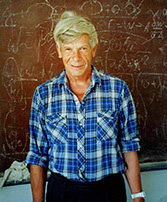Speaker
Description
We discuss thermalization process in the kinetic approximation in the presence of non--zero initial anomalous quantum expectation values on top of an initial non--plankian (non--thermal) level population. Namely we derive a system of ``kinetic'' equations for the level population and anomalous expectation values in four--dimensional massive scalar field theory with $\varphi^4$ self--interaction. We show analytically in the linear approximation that for small initial anomalous quantum average it relaxes down to zero. We show analytically that this system does not have an equilibrium solution with non--zero time independent anomalous expectation value.
In this paper we consider an initial state, containing non--plankian (non--thermal) level population, which is expressed via $Tr[\overset{\wedge}{\rho}a^+_{q}a_{q'}] \equiv <a^+_{q}a_{q'}>$, and anomalous averages, $Tr[\overset{\wedge}{\rho}a_{q}a_{q'}]\equiv <a_{q}a_{q'}>$. Our goal is to show that such a state will evolve in time towards the plankian level population, $n_p=\frac{1}{e^{\beta\epsilon_p}-1}$, and zero anomalous average. The plankian distribution of modes, $n_p$, is over the Poincare invariant ground state. Namely we would like to see thermalization process even for such an unusual initial state, which contains anomalous averages.
To show this phenomenon we derive a system of kinetic equations for the level--population and anomalous average. Then we show that this system has a solution with zero anomalous average and plankian level--population only for such modes, which diagonalize the free Hamiltonian. To derive the system of the generalized kinetic equations we use the standard text book methods. To have an analytic headway we consider spatially homogeneous states and small initial anomalous averages. But we also derive the system of kinetic equations for $n_p$ and $\chi_p$ without the latter assumptions.

